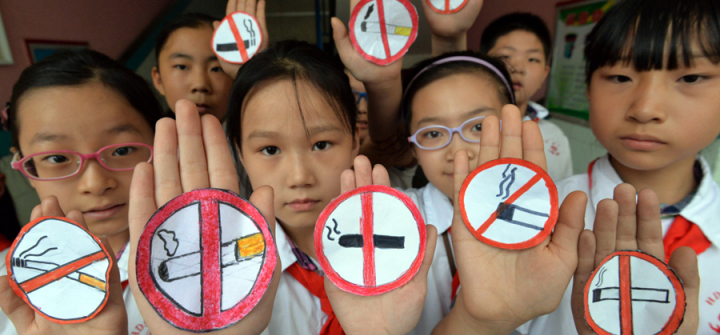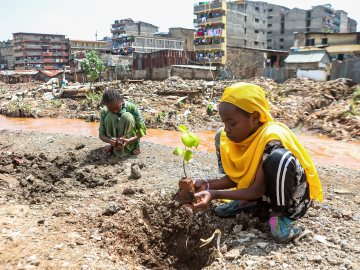Wanted: A Watchdog to STOP Big Tobacco in Its Tracks
Big Tobacco, beware: A new global watchdog will soon be on your tail.
The search is on for a lead organization for Stopping Tobacco Organizations and Products (STOP) that will aggressively track and monitor tobacco industry practices that undermine public health.
With an initial $20 million investment from Bloomberg Philanthropies, STOP will support the creation of a vigorous global monitoring system to call out the tobacco industry’s deceptive tactics—like aggressively marketing to children and teenagers in low- and middle-income countries, targeting countries weak on enforcement and rife with corruption, and pushing alternative products such as cessation devices while the evidence remains inconclusive. NGOs and academic institutions have until June 1, 2018 to submit their best and boldest ideas. To learn more about what STOP plans to achieve, GHN turned to Kelly Henning, a medical doctor and epidemiologist who leads the public health program at Bloomberg Philanthropies.
What do you hope STOP will achieve?
What we’re looking for is a global tobacco industry watchdog. Michael R. Bloomberg announced this new initiative to answer the need for new organizations dedicated to pushing back against the tobacco industry. The idea is that STOP will monitor the tobacco industry, go out and collect new data, organize existing data, and give the public the truth about how the industry is diverting attention away from effective tobacco control.
We see STOP as an important next step in our fight against tobacco—to shine a light on industry activity that is illegal, or crosses the line somewhat, or holds countries back from making progress on protecting their citizens from tobacco. The idea is to expose these acts so that other countries can see what is going on and prepare to do more on tobacco control.
What inspired the idea for a global watchdog?
We really know what works for tobacco control—it’s one of the good things about working on this issue. Between the WHO MPOWER policies and the WHO Framework Convention on Tobacco Control, the roadmap is very clear for what countries and governments can do to improve the health of their citizens. But what we face over and over again is this ceaseless pushback by the very well-funded tobacco industry against our work. Most recently, Philip Morris’s newly funded Foundation for a Smoke-Free World, announced not too many months ago, demonstrated how the tobacco industry uses every imaginable tactic to push back. That announcement made us stop and think that maybe there is more we should be doing to try to counter the tobacco industry’s interference with tobacco control. That was really what led Bloomberg Philanthropies to launch this effort.
You’ve called tobacco use a problem with a solution. Which tobacco control strategies have proven most effective, and how will STOP support those strategies?
Bloomberg Philanthropies is very supportive of the WHO’s MPOWER policies, which include posts in public places, advertising bans, warning the public about the dangers of tobacco through pack warnings, and other forms of public education. But tobacco taxation is probably the single most effective strategy among the MPOWER strategies. Raising the price of tobacco products has been shown to be highly effective in reducing tobacco use, particularly among young people and those with lesser available income, and that’s an area of tobacco control that Bloomberg Philanthropies focuses on a lot. We know that the tobacco industry does a lot to undermine progress on tobacco taxation, so certainly that will be one of the elements that we imagine organizations that apply for the STOP award will focus on. We envision that those organizations will collect information about interference by the tobacco companies, and on the ways that the tobacco industry is pushing back against government policy.
But the organization chosen to lead STOP will collect information on a global scale, correct?
STOP is meant to be a global effort. There will be examples undoubtedly that STOP will collect from particular countries on tobacco industry behavior and interference, and the idea is that information will inform public reports that will go out at least annually—hopefully more often—and that the information will be made publicly available so that governments can learn from what is happening in other countries and localities.
How will STOP be able to collect data and work in countries that have been friendly to the tobacco industry?
It’s definitely correct to say that in many countries the tobacco industry does fairly directly interfere with the law-making process to put in place policies that are favorable to tobacco control. And certainly STOP is going to want to look very carefully at examples of places and situations where the tobacco industry is interfering with strong tobacco control, either laws or regulations. We have examples of countries that will very clearly say, for example, that their tobacco taxation roadmaps—the information on how much tax they’re going to raise on tobacco in the coming 5-10 years—are actually made and created by the tobacco industry. That’s a difficult problem, and that’s the kind of thing that will be looked at by the STOP team. The watchdog will provide more granular information about what’s happening in such settings, and how countries might be able to resist that type of interference.
Would STOP also track countries that have strong laws or regulation in place, but where enforcement is weak?
It certainly could. In fact, in a place where the industry is preventing countries from moving ahead with enforcement, yes.
What kind of organizations do you envision applying? What strengths should they posses?
Applicant organizations can either come in alone, or in a group of 2 or 3—but at least one of those organizations must be from a low- or middle-income country. Eligible institutions include educational institutions or nonprofits or some combination. And I think what we’re really looking for is high quality work that is creative and feasible, and that really focuses on industry monitoring and data collection as well as making sure that whatever is collected is publicly accessible, easy to use, and presented in an understandable fashion. And then, we also envision that we will collaborate with other Bloomberg Philanthropies partners and our subgrant program so that information can be put to use quickly by those who work on the ground. Last but not least, we want to make sure that all of this information is highly visible.
What advice could you share with potential applicants?
I think clarity of mission and description is very important for us, as this is a fairly complex area, and there are a lot of moving pieces. The request for proposals online provides a fairly detailed account of what we’re requesting from applicants, and of course reviewing that will be very important for anyone that is applying.
Right now there is a lot of information out there about tobacco industry behavior, but it is scattered. Applyicants should demonstrate how they pull that together and make it understandable and usable. That’s what we’re really looking for.
Ed. Note: Michael R. Bloomberg is a benefactor of the Johns Hopkins Bloomberg School of Public Health, which publishes Global Health NOW. This interview has been edited lightly for clarity and length.
Join the tens of thousands of subscribers in more than 100 countries who rely on Global Health NOW summaries and exclusive articles for the latest public health news. Sign up for our free weekday enewsletter, and please share the link with friends and colleagues: http://www.globalhealthnow.org/subscribe.html
Students hold up no smoking signs to support World No Tobacco Day at a primary school in northern China's Hebei province, on May 30, 2016. STR/AFP/Getty Images





